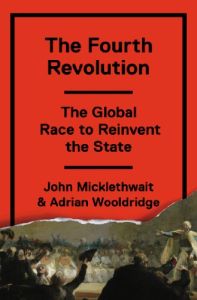Join getAbstract to access the summary!

Join getAbstract to access the summary!
John Micklethwait and Adrian Wooldridge
The Fourth Revolution
The Global Race to Reinvent the State
Penguin, 2014
What's inside?
Shrink the nanny state, but don’t kill it.
Recommendation
In this critique of the modern welfare state, British journalists John Micklethwait and Adrian Wooldridge argue in favor of the Ronald Reagan-Margaret Thatcher agenda of less government. They suggest that modern governments are out of control, and they offer compelling examples – such as the US government’s ill-fated public housing projects and George W. Bush’s embrace of the surveillance state. Treading in ideologically tricky territory, Micklethwait and Wooldridge work to offer a measured tone and reasonable prescriptions. While always politically neutral, getAbstract finds that this study will intrigue policy makers and interested citizens wishing for solutions to the seemingly intractable challenges of government bloat.
Summary
About the Authors
Editor in chief of Bloomberg News John Micklethwait is a former editor in chief of The Economist, where Adrian Wooldridge is managing editor. They co-wrote five books, including The Company: A Short History of a Revolutionary Idea and The Right Nation: Conservative Power in America.

















Comment on this summary